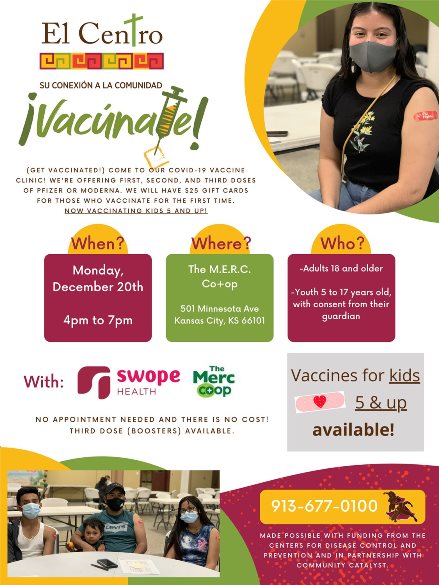Two Omicron cases have been confirmed in Wyandotte County, according to the Unified Government Health Department.
The Kansas Department of Health and Environment lab confirmed the Wyandotte County Omicron results over the weekend, said Janelle Friesen, public information officer for the Health Department.
The results were from two people who live in Wyandotte County. The KDHE labs are screening positive COVID-19 samples to check for genetic characteristics associated with the Omicron variant and sequencing samples to confirm if they are Omicron, the Health Department stated.
The two persons in Wyandotte County with confirmed cases were both adults between 20 and 30 years old, according to authorities. Both were fully vaccinated with two doses of an mRNA COVID-19 vaccine, according to the Health Department.
Anyone with any respiratory symptoms, such as a cough, fever, shortness of breath, wheezing, sore throat or loss of taste or smell, should get tested for COVID, according to a Health Department spokesman. A full description of possible COVID symptoms is on the CDC website at https://www.cdc.gov/coronavirus/2019-ncov/symptoms-testing/symptoms.html.
How to protect yourself from COVID
“With new COVID variants like Omicron, is more important than ever that we each take steps to protect ourselves and others from COVID,” said Juliann Van Liew, director of the Health Department, in a news release. “Vaccinations are still the best protection against serious illness and hospitalization from COVID, and boosters are especially important to help protect against Omicron. We also strongly encourage people to wear masks in public indoor spaces and continue social distancing. If you will be gathering or traveling for the holidays, we recommend testing before doing so, especially for those who are unvaccinated or are experiencing any symptoms.”
Vaccines are highly effective in preventing serious illness, hospitalizations and death, and protect against serious outcomes with the Omicron variant, according to the spokesman.
The Health Department spokesman also said testing is valuable if people are getting ready to travel, or plan to attend a big gathering or holiday events, as well as when they return from traveling.
Also, anyone who has been exposed to COVID or was in close contact with a person who tested positive should be tested four or five days after being exposed, according to the spokesman.
Vaccinations are still considered the best way to protect yourself and others from COVID, the spokesman stated. The Health Department recommends that residents get the booster shot as well as the initial shots. Booster shots are now available for those 16 and older, when there has been six months since the second dose of Pfizer and Moderna, or two months after the dose of Johnson and Johnson.
Those who are 6 to 17 can only receive the Pfizer vaccine currently, but if they are 18 and older, they may receive the other ones.
Immunity from COVID-19 vaccines wanes over time, and boosters help bring the immunity back up, the Health Department stated. Boosters appear to be especially important in protecting against the Omicron variant, according to research.
Masks also are important to help reduce the spread of COVID, according to the Health Department.
“We do encourage folks to wear a mask if they are going to e out and about in indoor public spaces,” Friesen said.
That also is the recommendation of the KDHE.
The Health Department also recommended staying at least 5 feet from other people who do not live in your household, when you are in public settings. This applies especially if you are at higher risk of getting sick, or you have people in your life who are at high risk.
Case numbers increasing
COVID cases in Wyandotte County, of all variants, are averaging 82 per day, which is four times higher than it was at the end of October, according to the spokesman.
The percent positivity of COVID-19 tests in Wyandotte County is about 33 percent, more than twice the level at the end of October.
Among new COVID cases in Wyandotte County in the past two weeks, about one-third were among children and teens ages 0 to 19, and one-third were among people in their 20s and 30s.
On Monday, Dec. 20, the Health Department reported 26,949 total cumulative COVID cases in Wyandotte County, with 402 total deaths. Since Friday, there was an increase of 143 COVID cases in Wyandotte County, and one new death.
Where to get vaccinations and boosters
The Health Department, which offers free vaccines and boosters, has special holiday hours this week and next week.
Hours are 10 a.m. to 6 p.m. for vaccinations Monday, Tuesday and Wednesday of these two weeks at the Health Department’s Kmart facility at 7836 State Ave. It will be closed Thursday and Friday.
Testing will be conducted at the Kmart site from 9 a.m. to 3 p.m. Monday, Tuesday and Wednesday for these two weeks.
The Kansas National Guard Armory at 18th and Ridge also offers testing by the KDHE, the spokesman stated. Their special holiday hours are listed on a calendar page at https://bit.ly/WyCoCOVIDtest. On Monday, Dec. 20, the Armory site was open from 11:30 a.m. to 8 p.m.
Special vaccine clinics also are scheduled, including one today at the Merc grocery store at 501 Minnesota Ave., Kansas City, Kansas. This clinic is sponsored by El Centro and it will be open from 4 p.m. to 7 p.m. Dec. 20. This clinic will have $25 gift cards for those Wyandotte County residents who get vaccinated for the first time. There is no charge for the vaccine. No appointment is necessary.
The Health Department also offers vaccines and testing at its downtown office at 619 Ann Ave., Kansas City, Kansas, by appointment only, telephone 913-573-8855.
Visit https://bit.ly/WyCoCOVIDtest to see what age groups qualify for the free vaccines, and the hours the sites are open. Check with WycoVaccines.org for additional information.
Vaccinations and boosters also are available at several area pharmacies and at some doctors’ offices in the community.
For more information about where vaccines are available, visit www.vaccines.gov.

